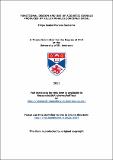Functional design and use of acoustic signals produced by killer whales (Orcinus orca)
Abstract
This study aimed to investigate possible functions of the sounds produced by
herring-eating killer whales in the Northeast Atlantic.
In this study, I investigated the whistle repertoire of killer whales, which had
previously only been studied in British Columbia, where it appeared to be restricted to
the audible range. However, I show that high frequency whistles (> 17 kHz) were
detected in Northeast Atlantic populations but not in Northeast Pacific populations.
These results indicated substantial intraspecific variation in whistle production in
killer whales. Little variation was observed in high frequency whistles recorded from
three different sites in the Northeast Atlantic, suggesting this signal has a similar
function across locations.
The estimated active space of high frequency whistles and burst-pulse calls
suggested that these are short-range signals used for within-group communication.
Source levels of burst-pulse calls were lower than what was previously described in
British Columbia, which possibly reflected the fact that these sounds do not need to
propagate far because distances between group members are generally short. Calls,
high frequency whistles and herding calls produced at different depths did not appear
to suffer effects due to increased pressure, such as changing frequency or duration
characteristics.
Feeding appeared to take place below 10 m of depth, as suggested by the
localisation of depth of production of feeding-related sounds. These depths were
consistent with those at which tailslaps were produced in Dtags attached to individual
whales. Feeding periods were characterised by deep diving, increased sound
production and highly non-directional movement. These findings suggested that killer
whales in a herring spawning ground use a feeding strategy different from carousel
feeding used in herring overwintering grounds.
These findings showed that Northeast Atlantic killer whales have a different sound
repertoire to other populations, and suggested that they may employ different feeding
strategies depending on prey behaviour.
Type
Thesis, PhD Doctor of Philosophy
Collections
Items in the St Andrews Research Repository are protected by copyright, with all rights reserved, unless otherwise indicated.

